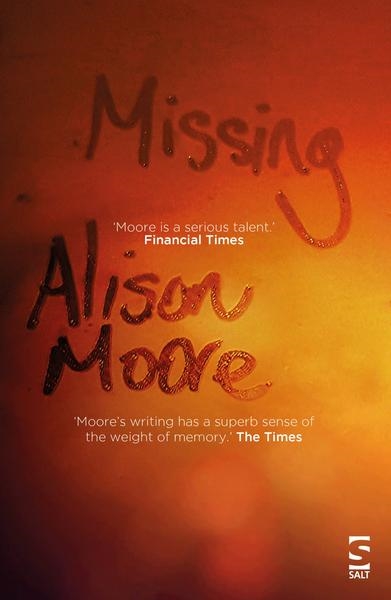Cath Barton sheds a light on Alison’s Moore’s new novel, Missing, which follows Jessie Noon who finds herself trapped in mystery.
Jessie Noon, the narrator of Alison Moore’s new novel, is a translator. Like her author, she deals in the precision of language. As she says, “Words can be tricky.” So can life; it trips us all up from time to time, though Jessie Noon seems to have more than her fair share of things – and people – going missing.

In Missing the mysterious sits alongside, and is grounded in, the minutiae of everyday life. Like you and me, Jessie buys frozen peas and eats fish suppers, but she also thinks she has a ghost in her house, the ghost of a little girl.
What though, are ghosts, but our memories of what has happened to us? We all have them, rising unexpectedly after years sometimes when sleep eludes us. Jessie Noon does not sleep well, and she has a recurring ear problem which makes her feel disconnected. Both her son Paul and husband Will have left home; she lives alone apart from a cat and a dog, which have their own shadows and discontentments.
The present-day narrative of the book is interspersed with the story of what happened in 1985 when Jessie had taken her sister’s Gail’s five-year-old daughter Eleanor to a museum. Alison Moore skilfully builds a sense of unease in the parallel stories; small things are lost – a child’s book, Jessie’s turquoise earrings, a jar of marmalade. Jessie’s mother writes a note in her Christmas card about a piece of sky in a jigsaw that her dad is missing, the final piece of the jigsaw
It has really upset him, her mother had written. We can’t think where it has gone. He’s hoping thatit may yet turn up. It’s a corner piece.
Alison Moore’s writing is at the same time straightforward and redolent of depths, her use of words always well-considered. Take, for example, her description of Jessie and Robert – a man with whom she is developing a relationship – sharing a fish supper, with which they have both ordered pickled onions. Nothing out of the ordinary happens, and yet things are stirred in Jessie’s mind. Afterwards, they do not arrange to meet again, for “There seemed no need when they shared a haunt.” And there we have it: ‘haunt’ is here ‘le mot juste’, a French expression which seems more accurately to convey the double meaning of ‘haunt’ than the English ‘the right word.’
Jessie’s memories, and her thoughts about the past lives of others, are as significant in her life as what is happening in her present. The recurring motif of Jessie’s reading of biographies of D H Lawrence highlights the issues which Alison Moore explores in this novel. Jessie has a sense of Lawrence “poised between worlds”, the rural and the industrial:
The characters that Jessie supposed to be him, in fictional form, were always torn between staying and leaving, torn between this world, this life, and another.
So it is with Jessie herself, who with each new biography, keeps Lawrence alive and then faces him dying all over again. And yet, she wonders, is death final?
Reading Missing for the second time I found it multi-layered, full of reflection on the nature of our experience, and yet written with such immediacy and freshness that the pages fly past. There is a tragedy at its core, and yet the characters carry on, as people do.
There is a third strand in the narrative – words from the missing Will. As first enigmatic, these become more and more precise and alongside them postcards arrive for Jessie announcing his imminent return. She seems unmoved by these, which I find slightly odd, but perhaps it is part of her disconnection. There is also another important character, and that is the house in which Jessie lives. It is, Jessie believes, the house in which her great-great-grandmother lived, and the connection is important to her. But things crack and break in the house – glass and crockery. There are scratchings. And a door that won’t stay closed, the door to her spare room, a room that Jessie does not like to disturb too much, a room in which on a moonlit night “the blue carpet looks like undisturbed water.” Jessie feels perturbed, watched even. And if there are ghosts at times it almost seems as if she is a ghost herself; Robert calls her bloodless, she’s so white, and at one point she feels that her sister’s husband is looking through her.
I think, though, that it would be a mistake to categorise Missing as a ghost story. To me, it is much more about life, and its mysteries, than death. And not everything stays missing. The jar of marmalade and the lost jewellery turn up as, remarkably! does the final piece of the jigsaw. Jessie gets her ears treated, has a feeling of reconnection as a result. But her preoccupations have not changed – she starts on a new biography of Lawrence! And the book is not a neatly finished jigsaw – the final page made me shiver!
Missing by Alison Moore is available now from Salt Publishing
Cath Barton is an English writer who lives in Wales. Her novella The Plankton Collector will be published in September 2018 by New Welsh Review. Cath is on the 2018 Literature Wales Mentoring programme, working on a collection of short stories inspired by the work of Hieronymus Bosch. https://cathbarton.com@CathBarton1



 Enjoyed this article? Support our writers directly by buying them a coffee and clicking this link.
Enjoyed this article? Support our writers directly by buying them a coffee and clicking this link.







